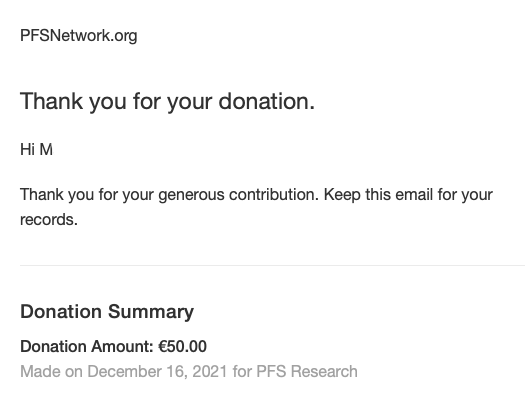Donate here: https://www.pfsnetwork.org/donate
Yo, we are only $40,000 from funding this project. Its a new team of researchers that is passionate about actually finding a MOA and a cure and they are working “at cost” so all new research will be manageable to fund and building off what the epigenetic research that basically confirmed the AR theory. Now its time to pinpoint the issue, build animal models, and therapeutic approaches! We can probably do all of these in the same amount of time it took Baylor / Khera to do one study with this new team!
The PFS Network is matching all donations up to $5,000.
Better yet, this team is not going to take a damn decade like Baylor/Khera did and will be super transparent on the results and steps.
I’ll start this thing off, here is $50 ($100 with PFS Network contribution!). Step up guys, this new research team is what we have been begging for for 15 years!

Elucidating epigenetic mechanisms as a cause of Post-Finasteride Syndrome
Expected to begin in early 2022, The Institute for Human Genetics at the University Medical Center Schleswig-Holstein will be building on the important results from Baylor College of Medicine. These landmark findings demonstrated significant deregulation of gene expression in PFS patient tissue which correlated to observed biological differences in patients and their self-reported symptoms. While Baylor’s results indicate a what , we now need to expand into the why with more modern investigative techniques.
The objective of this research is to investigate induced epigenetic changes, including altered methylation in the AR regulatory region, or alterations to the chromatin landscape, which may underlie a pathologically changed sensitivity to androgens and the widespread dysregulation of gene expression discovered in Baylor’s research. Elucidation and understanding of disease mechanisms is a necessary step in identifying potential treatments of Post-Finasteride Syndrome.
In this study, researchers will use state-of-the-art high throughput sequencing to investigate potential changes in the spatial organisation of chromatin. Chromatin structure is a key component in gene expression, and identifying changes could provide key insights into the pathological drivers underlying altered gene expression in Post-Finasteride Syndrome.
This investigation is crucial as identification of driving epigenetic changes will allow for accurate modelling of Post-Finasteride Syndrome in animals. Such modelling will help us understand the core pathomechanism and hopefully identify targets for therapeutic treatments of PFS to benefit you or your loved one.
The scientists involved in conducting this research have world leading expertise. The supervising lead has diagnosed a molecular level androgen insensitivity driven by epigenetics as opposed to code variation. Another scientist lending his collaborative input has published in Cell reports evidence that overexpression of the AR is able to drive genome-wide chromatin relaxation and gene expression alteration in refractory prostate cancer. Finally, sequencing and interpretation expertise will be lent by a professor who reviewed the state of the art in structural and quantitative chromosomal rearrangements, their analysis, and role in disease in Nature reviews.
The project will cost approximately €80,000, pending sample collection. Large donors are encouraged to contact us directly.
This important study can only take place with your support. If you or a loved one are affected by Post-Finasteride Syndrome, please give generously by clicking the button above.




